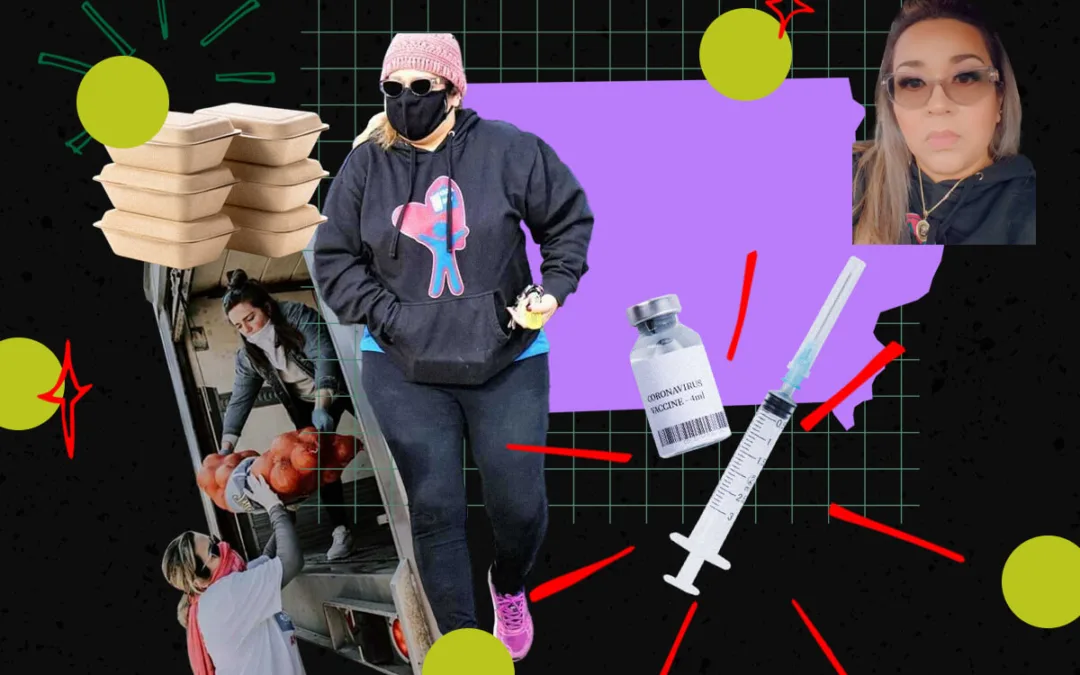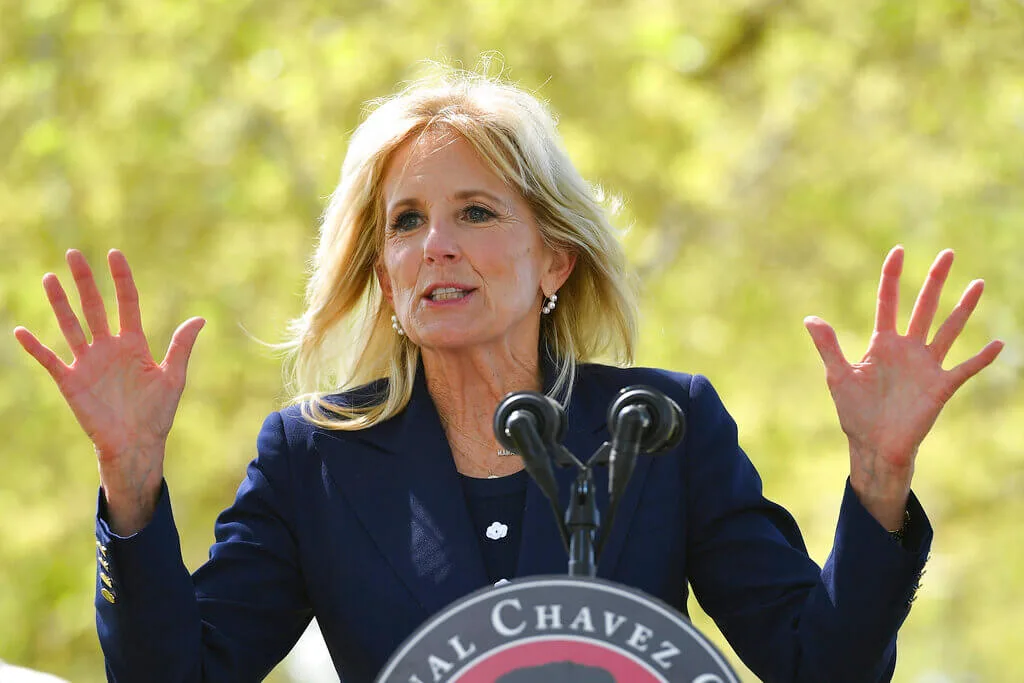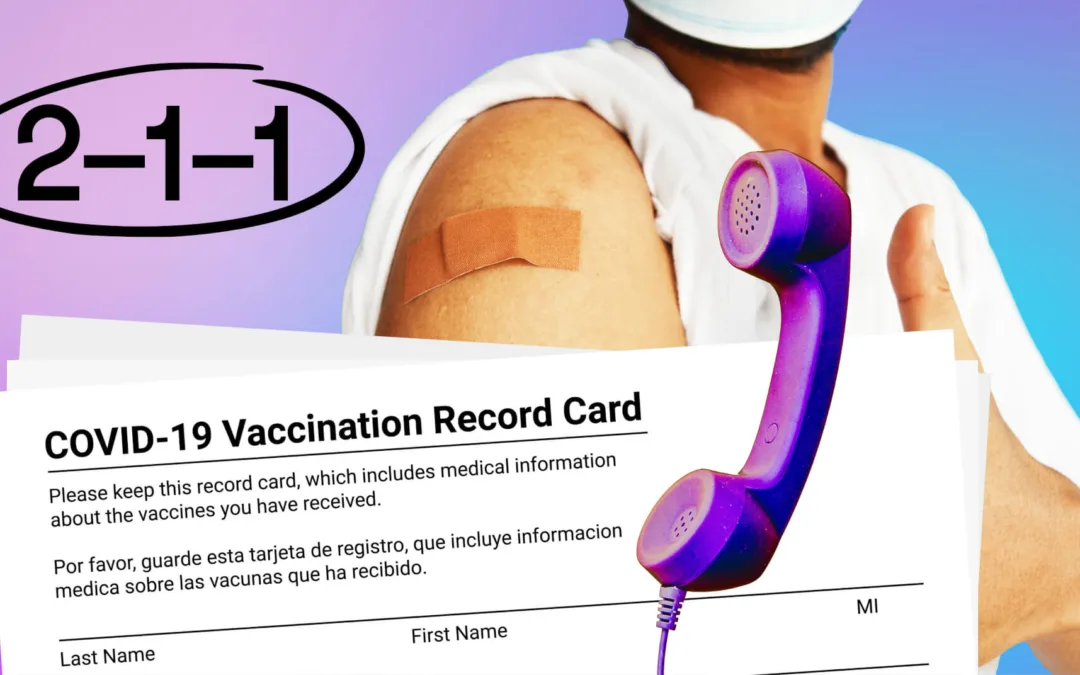
Waitress Penny Thompson, left, wearing a face mask serves Steve Zell, right, and his wife Julie at Notorious Burgers restaurant in Carlsbad, Calif., on Friday, Dec. 18, 2020. (AP Photo/Ringo H.W. Chiu)
The trend to pay workers to get vaccinated comes as public health officials are struggling to push back against vaccine hesitancy, a hurdle in the nation’s quest to bring the pandemic to an end.
Olive Garden and Longhorn Steakhouse announced on Tuesday that they would pay hourly workers to receive the coronavirus vaccine, becoming the latest companies to incentivize employees to get their shots.
Orlando-based Darden Restaurants, which owns both restaurant chains along with several others, said it would provide workers with two hours of pay for each dose of the vaccine they receive. The multi-brand restaurant company said it will pay wages for up to four hours of total compensation so that workers “do not have to choose between earning income and getting vaccinated.”
“The COVID–19 vaccine will be a critical tool in helping end this pandemic, which will allow us to welcome more guests and team members back into our restaurants,” Darden chairman and CEO Gene Lee wrote in a letter to employees. “We strongly encourage you to consider getting vaccinated.”
Lee joins a growing number of companies who are providing financial incentives to workers to get vaccinated—an idea some medical experts support
“We should be supporting people to get vaccinated,” Dr. Dara Kass, associate professor of emergency medicine at the Columbia University Medical Center, told COURIER.
Employer strategies to encourage vaccination come as American business, government, and medical workers and experts struggle to push back against vaccine hesitancy. Kass believes that to encourage employees to get vaccinated, companies should give them paid time off or reimburse them with stipends if they have to take unpaid time off, so “they don’t lose money.”
A handful of companies are doing just that. Grocery stores Aldi, Dollar General, and Trader Joe’s provide hourly workers with two hours of pay for each dose, while greek yogurt maker Chobani is giving workers three hours of paid time off for each shot. Meanwhile, the digital grocery-delivery app Instacart is offering a $25 stipend for eligible workers and contractors.
“There’s a real case that you need to pay people to take a day off of work to get vaccinated, and also the day afterwards,” said Kass. “We know for certain that this vaccine causes side effects.”
While those side effects are mild for most, some people have found themselves battling more serious fevers or fatigue after getting their shots. For those workers who experience more significant side effects, the security of having that paid time off could be critical, Kass said.
Dr. Geeta Nayyar, an assistant clinical professor of medicine at Florida International University, said that getting every American vaccinated is the “number one imperative.” However, she counts herself among those experts who are wary of providing financial incentives to workers to get their shots.
“The biggest barrier right now that we have to the vaccine and actually getting it is establishing trust and good information, and I think when you blur that line of money with taking the vaccine, it’s just putting people in a tough spot,” Nayyar told COURIER. “I think that it’s really about people taking steps to educate themselves, get good information, and then make a personal choice as an individual or family. I think it’s important that we not mix economics with that.”
Nayyar does believe that companies should accommodate workers to get their vaccines, adding that “No one’s work schedule should keep them from getting the vaccine.” But she fears paying people to get inoculated may cause even more skepticism about the vaccine at a time when trust is critical.
“I’m just seeing so many patients coming in with bad information, and I think if they just get good information, it will naturally lead to good decisions,” she said.
Nayyar would prefer to see companies incentivize workers to educate themselves with useful information, such as by reading the CDC’s website or watching an informational video from a trusted medical source.
She also worries about what kind of long-term precedent paying people to get vaccinated could set. “Sometimes you end up opening up other problems when you start setting these precedents that we’ve never had before.”
Some lawmakers, such as Gov. Andrew Cuomo (D-NY), have also backed the idea of providing financial support to workers to get vaccines. As part of a new budget proposal introduced last week, Cuomo called for all workers in the state to receive up to four hours of paid leave at their regular pay rate to get the two doses of their vaccine.
But that proposal is unlikely to make a substantial difference anytime soon. Even if the state legislature approves Cuomo’s request, the measure won’t take effect until he signs the budget, which isn’t expected to happen until late March.
While Aldi, Olive Garden, Trader Joe’s, and their other peers are incentivizing and encouraging workers to get vaccinated, none of them require it, even though they legally have the right to do so in most cases.
“We understand the decision to receive the COVID-19 vaccination is a personal choice, and although we are encouraging employees to take it, we are not requiring them to do so,” Dollar General said in a statement.
Most other companies have been similarly reluctant to require workers to get vaccinated, but at least one corporate giant, United Airlines, is actively considering mandating vaccines for workers.
“I think the right thing to do is for United Airlines, and for other companies, to require the vaccines and to make them mandatory,” United CEO Scott Kirby told workers at a meeting last week, according to a transcript reviewed by Reuters.
Much like she’s concerned about the unintended consequences of paying workers to get their shots, Nayyar is also nervous about the impact of required vaccinations.
“My biggest concern as a doc is trust, and I just worry that we have to maintain trust. In order to have trust, you have to have options and choices,” Nayyar said. “I really do believe that if you give people the opportunity to make good choices with good information, they will naturally make those choices. But when anyone feels that they’re backed into the wall, it just changes the whole picture.”
While Nayyar is anxious about these ideas going too far, some economists, politicians, and progressive thinkers have embraced going even further and paying all Americans to get vaccinated. Robert Litan, an economist with ties to the Brookings Institution suggested that every American should receive $200 for both shots and then an additional $800 once the country reaches herd immunity for a total of $1,000. The idea drew support from former Democratic presidential candidates John Delaney and Andrew Yang.
The odds of Litan’s idea becoming a reality are remote, but they further speak to the importance of achieving widespread vaccination. Despite her reluctance to endorse these ideas, Nayyar is aggressively urging people to get vaccinated in her own way: by emphasizing the safety of the vaccines as proven by science.
Both the Pfizer and Moderna vaccines underwent all three phases of clinical trials and were found to be over 94% effective in preventing mild and severe forms of COVID-19. Preliminary data out of Israel, which currently leads the world in vaccinating its population, has shown a substantial drop in both infections and hospitalizations after just one dose, and almost no cases after two. Meanwhile, more than 25 million Americans have contracted COVID-19, and nearly 430,000 have died.
Nayyar is confident that the risk of contracting COVID-19 is “dramatically worse” than that of receiving the vaccine.
“The vaccine has been well-studied, well-established across populations that reflect the population of America,” Nayyar said. “We know that this is a safe vaccine.” While Nayyar admits we don’t know everything about the effects of the COVID-19 vaccines, she said there’s no denying the dangerous outcomes of the virus itself. “People are dying, and when we have a vaccine, it is preventable.”
It’s unclear how many more companies will follow Aldi, Dollar General, and Trader Joe’s in their efforts. A spokesperson for the National Grocers Association (NGA), a trade association comprising more than 1,500 retail and wholesale grocers, said the organization is leaving those decisions up to individual members.
“Strategies concerning vaccination will vary from retailer to retailer,” Jim Dudlicek, director of communications and external affairs for the NGA, said in an emailed statement to COURIER.
READ MORE: Despite Claims to the Contrary, Data Shows Shutdowns Weren’t the Major Force Behind Job Losses
Politics

Teamsters and UPS Reach Tentative Deal to Avoid Strike, 340,000 Workers to Get Raises
The tentative deal represents a huge win for full- and part-time UPS Teamster workers, who would get significant pay raises and better working...



One Republican Senator Is Blocking 265 Military Promotions, Leaving the Marines Without a Confirmed Leader
Sen. Tommy Tuberville's decision means these military officers are not getting the pay raises they’re owed, cannot move their families to wherever...
Local News



Teamsters and UPS Reach Tentative Deal to Avoid Strike, 340,000 Workers to Get Raises
The tentative deal represents a huge win for full- and part-time UPS Teamster workers, who would get significant pay raises and better working...



One Republican Senator Is Blocking 265 Military Promotions, Leaving the Marines Without a Confirmed Leader
Sen. Tommy Tuberville's decision means these military officers are not getting the pay raises they’re owed, cannot move their families to wherever...




